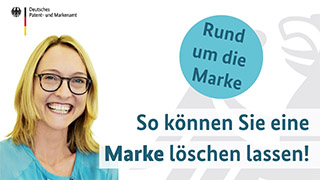Content
Opposition and Cancellation

To enable the DPMA to make a speedy decision on the opposition
In order to decide as quickly as possible whether a challenged trade mark will be cancelled (in full or in part), the DPMA works towards speedy opposition proceedings. The legally prescribed minimum periods of one to two months are therefore granted for making statements and extending time limits. Further extensions of time limits will only be granted with the consent of the opponent. As a rule, the concluding statement should be made in the second written statement submitted.
Opposition to a registration
After the publication of the newly registered trade mark, the proprietors of earlier trade marks can file a notice of opposition against the registration. Opposition can generally be raised if the proprietor fears that there is a risk of confusion with their own trade mark applied for or registered. This also applies to a European Union trade mark or an internationally registered mark (international registration). Notice of opposition must be filed in writing within three months after the publication of the registration. The opposition fee of 250 euros must be paid within this period too. It includes the opposition on the basis of one opposing sign. If an opposition is based on several earlier opposing signs of the same proprietor, an additional fee of 50 euros must be paid for each additional opposing sign. If the proprietors are not identical, this means that there are several oppositions, and 250 euros must be paid for each. During opposition proceedings a decision is taken on the opposition. Possibly, the newly registered trade mark will be cancelled.
Opposition can also be raised on the basis of earlier rights to signs acquired by use (“trade marks acquired through use” and commercial designations). Furthermore, it is possible to invoke rights arising from the enlarged protection of trade marks which are well known in Germany (Sec. 42(2) Trade Mark Act [Markengesetz]). However, this provision only applies to oppositions raised against the registration of trade marks applied for on or after 1 October 2009.
Furthermore, the opposition may also be based on a protected geographical indication and a protected designation of origin, provided that the application for the trade mark in respect of which the opposition has been lodged was filed on or after 14 January 2019.
-
 Form W 7202 (1,8 MB): opposition against the registration of a trade mark (in German)
Form W 7202 (1,8 MB): opposition against the registration of a trade mark (in German) -
 Form W 7202.1: Annex to opposition based on registered signs (in German)
Form W 7202.1: Annex to opposition based on registered signs (in German) -
 Form W 7202.2: Annex to opposition based on non-registered signs (in German)
Form W 7202.2: Annex to opposition based on non-registered signs (in German) -
 Note (1,79 MB) for detailed information, please also refer to the guidelines for trademark opposition proceedings (in German)
Note (1,79 MB) for detailed information, please also refer to the guidelines for trademark opposition proceedings (in German) -
 Information sheet on oppositions based on non-registered rights to signs and on the special protection of a well-known trade mark (in German)
Information sheet on oppositions based on non-registered rights to signs and on the special protection of a well-known trade mark (in German)
In the video: How can a trade mark be cancelled or declared invalid? Webinar in cooperation with the EUIPO
Why a trade mark can be cancelled
The proprietor of a trade mark can surrender the trade mark anytime. A trade mark may also be cancelled because of invalidity or revocation.
Cancellation because of surrender
The proprietor of a trade mark can surrender the trade mark anytime.
-
 Form W 7437: request for full/partial cancellation because of surrender (in German)
Form W 7437: request for full/partial cancellation because of surrender (in German)
Declaration of invalidity and cancellation due to absolute grounds for refusal
The registration of a trade mark will be declared invalid and cancelled upon request due to absolute grounds for refusal, if it had been registered contrary to Section 3, 7 or 8 of the Trade Mark Act, that means if it is not eligible for trade mark protection, if the applicant was not capable of being the proprietor of a trade mark or if there were absolute grounds for refusal. The application for a declaration of invalidity must be filed in writing and the facts and evidence in support of the statement of grounds must be indicated (section 53 (1) sentences 1 and 2 of the Trade Mark Act). A fee of 400 euros must be paid within three months from filing the application.
In the case of an application pursuant to section 50 (2) sentence 3 of the Trade Mark Act in conjunction with section 8 (2) nos. 1 - 3 of the Trade Mark Act, this application must be filed within ten years after the trade mark was registered.
Furthermore, section 8 (2) nos. 1 - 3 of the Trade Mark Act does not apply to invalidity proceedings pursuant to section 50 (2) sentence 2 of the Trade Mark Act if, up to the time of the application for a declaration of invalidity, the trade mark has become established in the relevant trade circles following the use which has been made of it in respect of the goods and services for which it was registered.
The DPMA informs the trade mark proprietor about the application for a declaration of invalidity. If the proprietor does not object within two months, the trade mark will be declared invalid and cancelled; if an objection is made, invalidity proceedings will be conducted before the DPMA. If the application is granted, the registration of the trade mark is declared invalid because of absolute grounds for refusal under Section 50 of the Trade Mark Act and cancelled from the Register.
-
 Form W 7442 (1,18 MB): application for a full/partial declaration of invalidity and full/partial cancellation of a trade mark or the full/partial invalidation of an international registration of a mark because of absolute grounds for refusal (in German)
Form W 7442 (1,18 MB): application for a full/partial declaration of invalidity and full/partial cancellation of a trade mark or the full/partial invalidation of an international registration of a mark because of absolute grounds for refusal (in German)
Declaration of invalidity and cancellation due to the existence of earlier rights
Upon request, the registration of a trade mark can also be declared invalid and cancelled due to the existence of earlier rights. For this purpose, you can either file an action before an ordinary court or you file an application for a declaration of invalidity with the DPMA.
Such application must be filed in writing and the facts and evidence in support of the statement of grounds must be indicated (section 53 (1) sentences 1 and 2 of the Trade Mark Act).
The holders of the rights stipulated in sections 9 to 13 of the Trade Mark Act and persons entitled to invoke rights resulting from a protected geographical indication or a protected designation of origin (section 53 (3) of the Trade Mark Act) are entitled to file such applications. The application can also be based on several earlier rights of the same holder (section 51 (1) of the Trade Mark Act).
Section 51 (2) to (4) of the Trade Mark Act contains provisions that exclude the declaration of invalidity because of conflicting earlier rights in certain cases (e.g. in case of acquiescence of the later trade mark or non-use of the earlier trade mark).
A fee of 400 euros must be paid within three months from filing the application. If the application for a declaration of invalidity is based on more than one earlier right, an additional fee of 100 euros must be paid with respect to each additional right.
The DPMA notifies the trade mark proprietor of the application for a declaration of invalidity. If he does not object to it within two months, the trade mark is declared invalid and cancelled; if an objection is made, invalidity proceedings are conducted before the DPMA. If the application is granted, the trade mark registration is declared invalid due to the existence of earlier rights and cancelled from the Register (section 51 of the Trade Mark Act).
-
 Form W 7642 (2,12 MB): application for a declaration of full/partial invalidity and full/partial cancellation of a trade mark or full/partial invalidation of an international registration of a mark due to earlier rights (in German)
Form W 7642 (2,12 MB): application for a declaration of full/partial invalidity and full/partial cancellation of a trade mark or full/partial invalidation of an international registration of a mark due to earlier rights (in German)
-
 Formular W 7642.1 (2,16 MB): annex to the application for a declaration of invalidity due to earlier rights for registered earlier rights on which the application is based (in German)
Formular W 7642.1 (2,16 MB): annex to the application for a declaration of invalidity due to earlier rights for registered earlier rights on which the application is based (in German)
-
 Formular W 7642.2 (1,56 MB): annex to the application for a declaration of invalidity due to earlier rights for non-registered earlier rights on which the application is based (in German)
Formular W 7642.2 (1,56 MB): annex to the application for a declaration of invalidity due to earlier rights for non-registered earlier rights on which the application is based (in German)
Declaration of invalidity and cancellation due to the existence of conflicting earlier rights
Trade mark proprietors may bring an action for invalidity on the basis of the existence of earlier rights. Invalidity proceedings are conducted before the ordinary courts. From May 2020, invalidity proceedings based on conflicting earlier rights will also be available as an alternative at the DPMA.
Revocation and cancellation
The registration of a trade mark is revoked and cancelled upon request if the trade mark has not been used within a period of five years after registration (section 49 of the Trade Mark Act). In this case, you can either lodge an action before the ordinary courts or file an application for revocation with the DPMA.
Such application must be filed in writing and the facts and evidence in support of the statement of grounds must be indicated (section 53 (1) sentences 1 and 2 of the Trade Mark Act). The fee for this is 100 euros. It must be paid within three months after filing of the application.
The office notifies the trade mark proprietor about the application for revocation. If the proprietor does not object within two months, the trade mark will be revoked and cancelled from the Trade Mark Register; if an objection is made, revocation proceedings will only be continued before the DPMA if the person filing the application pays a fee of 300 euros for pursuing the application further. In adversarial proceedings it will then be decided whether the trade mark must be revoked and cancelled from the Trade Mark Register. If the fee for pursuing the application further is not paid, the revocation proceedings before the DPMA are deemed to be concluded. The trade mark will not be declared invalid or cancelled due to revocation.
-
 Form W 7440 (2,2 MB): application for full/partial revocation and full/partial cancellation of a trade mark or the full/partial invalidation of an international registration of a mark (in German)
Form W 7440 (2,2 MB): application for full/partial revocation and full/partial cancellation of a trade mark or the full/partial invalidation of an international registration of a mark (in German)
International registrations of marks
The provisions on invalidity and revocation proceedings set out above apply accordingly to the part of international registrations of marks that extends to Germany, section 115 of the Trade Mark Act.
Picture: iStock.com/Nastco
Last updated: 10 December 2025


Not only protecting innovations
Social Media